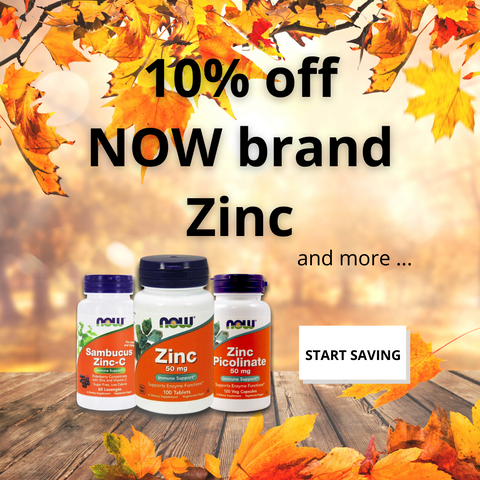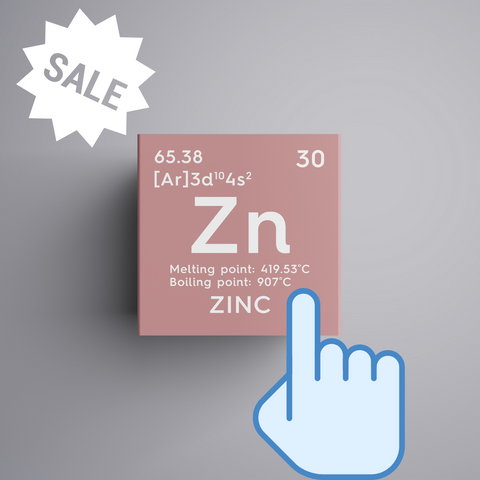
The Surprising Link Between Zinc, Vitamin D, and COVID
Exciting research over the past several months has shown promising impacts of nutrient supplements on battling the SARS-COV-2, or the novel coronavirus that causes COVID-19. While research is still being conducted, and there is still a lot to learn about this new illness and its total impacts on peoples’ health, it is worth noting the results seen thus far in treating patients with nutrient supplements like zinc and vitamin D3. The world is still in the early stages of understanding everything about COVID-19, but the following information is certainly helpful in giving us an understanding toward battling the virus through healthy living. In fact, zinc in particular can do a lot for your body.
 What we know so far about COVID-19 is that it disproportionately impacts the elderly, and more specifically people aged 80 and up. However, younger people have also been hospitalized for COVID-19, and in many cases it proved fatal. That poses the question: what is it about people that causes them to be adversely affected by this disease versus people who are only moderately affected or who have no symptoms at all? Again, the verdict is still out on the 100% definitive cause, but some studies we will discuss below show some promising insights into how zinc and vitamin D can help with the treatment of COVID-19 symptoms both at home and in the hospitals.
What we know so far about COVID-19 is that it disproportionately impacts the elderly, and more specifically people aged 80 and up. However, younger people have also been hospitalized for COVID-19, and in many cases it proved fatal. That poses the question: what is it about people that causes them to be adversely affected by this disease versus people who are only moderately affected or who have no symptoms at all? Again, the verdict is still out on the 100% definitive cause, but some studies we will discuss below show some promising insights into how zinc and vitamin D can help with the treatment of COVID-19 symptoms both at home and in the hospitals.
Sadly, there is no conclusive evidence of any product, natural or manmade, that can prevent or cure COVID-19. But we do see, as with our earlier article about Elderberry supplements, that incorporating vitamins and essential nutrients into our diets can help to treat the symptoms of influenzas, including the coronavirus, and may aid in keeping people from developing more serious symptoms. One major factor discovered in a study back in April of 2020 is that zinc and vitamin D deficiency may be a factor in the more serious reactions to COVID-19, up to and including death. Zinc and vitamin D are both micronutrients that boost the immune system’s responsiveness to viruses by reducing inflammation.
In August of this year, research conducted in South Korea found a surprising link between individuals who were hospitalized for COVID-19. A shocking 76% of these patients were vitamin D deficient. The ages of the patients ranged from people in their teens to people in their 70s, and in each case the majority were deficient in vitamin D. Vitamin D deficiency is mostly common with individuals in their late 60s and older, and can cause a wide range of health issues from fatigue and depression to bone pain and muscle cramps. What caused the younger individuals to be low on vitamin D was not addressed in the study, but it is a shocking example of how lacking a common vitamin which is found in many foods and is usually created in the body by reaction to sunlight can truly impact your body’s response to the coronavirus.
More research has shown that individuals above the age of 50 who are deficient in vitamin D are much more likely to contract COVID-19 and require hospitalization. Again, this is a recent study published just last month, and with only six months of clinical trials dedicated to the study of COVID-19, there is still a lot of information lacking. However, these initial cases show us that making sure your body has enough zinc and vitamin D, while normally essential for everyday health, may also help you ward off COVID-19 completely, or at the very least recover from it more quickly with less serious symptoms.
Another study published just a month ago in Barcelona, Spain, showed a striking correlation between low levels of zinc and adverse impacts of COVID-19 symptoms. The study included a total of 611 patients with a mean age of 63 years. Researchers compared the overall zinc levels of those patients upon admission to the hospital for the coronavirus.
The research is still being conducted, and a second wave of the virus is currently hitting Spain, further complicating the study. However, this initial information is undoubtedly very helpful and is further supported by another study conducted in hospitals in India which showed the same results. Their conclusion stated, “Our data clearly shows that significant number of COVID-19 patients are Zinc deficient. These Zinc deficient patients developed more complications with prolonged hospital stay and were associated with increased mortality.”(1)
Yet another study published in Japan at the beginning of September went as far as to say that taking zinc may be able to prevent patients from contracting COVID-19, or at least from experiencing more serious symptoms. However, they are still monitoring the situation and note that while zinc deficiency is absolutely a factor in patients hospitalized with the coronavirus, having too much zinc may also place people at risk. So, ensuring that people are maintaining the proper level of zinc in their body is the key factor – you don’t want to have too much or too little.
So how much is the right amount? Well, the first thing to remember is that most people under the age of 65 get enough zinc in their diet. Zinc is found naturally in foods like shellfish, salmon, beef, poultry, mushrooms, and many nuts, grains, and legumes. According to The National Institutes of Health, adults should take at most about 40 mg of zinc each day, and that infants and babies should be getting no more than 4 mg per day. And aside from being more at risk for contracting a serious case of COVID-19, there are many other diseases that zinc deficiency can cause.
This is the same with vitamin D deficiency. One study concluded that 30% - 50% of Americans are vitamin D deficient. Since humans get a lot of vitamin D through exposure the sun, and society is becoming more and more sedentary particularly with COVID-19 lockdown measures, it only makes sense that we are all getting less vitamin D than we need. Some of the symptoms of vitamin D deficiency include: frequent illness and infections, fatigue and tiredness, depression, bone and back pain, impaired wound healing, muscle pain, and hair loss.
We hope this information helps you to understand the importance of eating right and being healthy, to make sure you get enough zinc in your diet and vitamin D from both foods and sunlight. The currently coronavirus pandemic so far shows no signs of going away, so make sure you do what you can to keep healthy and follow all mandated health guidelines to protect yourself and those you love. It is also definitely worthwhile to keep a supply of zinc and vitamin D supplements just in case you are not able to always get outside and eat the foods you need to maintain proper levels of both essential nutrients.
We at Nutricelebrity are not doctors and cannot offer medical advice, so we do recommend that you consult your physician about your own specific health concerns.




Comments
Leave a comment